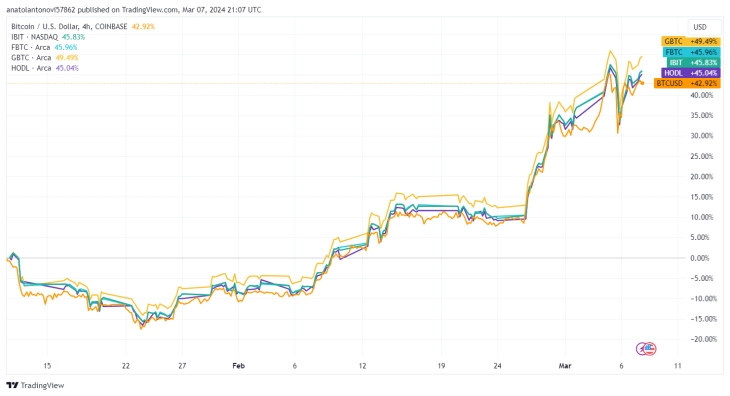Bitcoin ETF vs BTC: Which is a Better Investment?


Main Content:
- The prices of Bitcoin and Bitcoin ETFs are almost identical.
- ETFs are better suited for investors who want to manage Bitcoin and other investments in traditional brokerage accounts like stocks and bonds.
- Buying and holding Bitcoin directly is better suited for investors who are comfortable with setting up and managing cryptocurrency accounts or wallets and are confident in cryptocurrencies. It also opens up the possibility of participating in DeFi opportunities.
Now that a spot Bitcoin ETF has been approved by the SEC, it is easier than ever for cryptocurrency investors to purchase Bitcoin and hold it in their portfolios. (See our Bitcoin ETF investment guide.)
But smart investors still ask the following questions: Is it worth investing in Bitcoin ETFs instead of actual Bitcoin?
In this article, we’ll look at the key differences between the two options and help you decide which one is best for your portfolio.
Bitcoin ETF vs. Hold Bitcoin directly
Bitcoin ETFs are linked to the price of Bitcoin based on market capitalization, but differ significantly from their core asset.
Let’s take a look at how they differ depending on several factors.
accessibility
Both Bitcoin and Bitcoin ETFs are easily accessible to institutional and individual investors.
- Bitcoin is listed on hundreds of cryptocurrency exchanges., including popular platforms such as Coinbase and Binance. Investors can purchase cryptocurrencies by paying with fiat currency or exchanging digital currencies. In this case, they own the Bitcoin and can transfer it to a secure digital wallet to access their private keys.
- Bitcoin ETFs are highly liquid and more accessible to existing investors.. You can purchase ETF shares through traditional brokers such as Schwab and Etrade, which make it easy to purchase ETF shares by paying with fiat currency.
effectiveness
While Bitcoin is available 24/7, ETF shares can only be traded during market hours, which are 9:30 a.m. to 4:00 p.m. ET on business days. This could mean that investors looking for a direct approach may find ETFs too traditional.
danger
Investing in Bitcoin through a reputable cryptocurrency exchange or purchasing ETF shares through a broker is a safe approach. However, the former carries slightly more risk, especially for less tech-savvy investors.
Storing cryptocurrency assets in hot wallets may be riskier due to potential hacking attacks or exchange failures such as those experienced by FTX. The safest way is to move your funds to a secure hardware wallet, but if you lose your wallet or lose access to your private keys, your cryptocurrency funds are gone forever.
Investing in ETFs is generally safe because the funds are regulated, but shareholders must trust the issuing company.
report
Because ETFs store Bitcoin, they earn similar returns over time. Nonetheless, ETFs can sometimes be more volatile. As of this writing, they have surpassed BTC.

Short-term traders should also consider that ETFs are not available for over-the-counter trading.
charge
Trading Bitcoin ETF stocks can be a little more expensive. Most Bitcoin ETFs, including those offered by BlackRock, VanEck, and Fidelity, charge a fee of 0.25% per transaction. Grayscale’s ETF, which accounts for more than 60% of all Bitcoin ETF holdings, charges a 1.5% fee.
Trading fees on cryptocurrency exchanges are much lower. For Coinbase, for example, fees range from 0.05% to 0.6%.
regulation
The SEC fully regulates Bitcoin ETFs, which governs the entire Bitcoin reserve.
Bitcoin itself is hosted by a global decentralized network that has no authority to control it, and regulation of cryptocurrency platforms remains limited in the United States.
Especially in the United States, Bitcoin is treated as a commodity, while ETF shares are treated as securities.
Considerations for Investors
Bitcoin ETFs and physical Bitcoin react to the same market conditions. Additionally, because price quotes move at almost the same time, they are almost perfectly positively correlated, giving them the same risk profile.
However, when it comes to your investment goals, the two options may meet different needs.
In particular, ETFs are easier for investors looking to diversify traditional portfolios that also allocate to stocks and bonds (a strategy we follow in the Blockchain Believers portfolio). You can store all your stocks, bonds, and bitcoins in one account.
If you want to hold Bitcoin directly, you will need to open a separate account or wallet to hold your Bitcoin and a brokerage account. It’s a little more complicated, but it gives you control over your BTC.

What is a Bitcoin ETF?
Bitcoin spot ETFs are investment funds that provide investors with direct exposure to Bitcoin.
ETFs are listed on traditional stock markets such as NASDAQ and the New York Stock Exchange (NYSE) and are regulated by the SEC.
These ETFs are required to hold actual Bitcoin with their custodians, which allows them to closely track the price of Bitcoin.
What is Bitcoin (BTC)?
Bitcoin is a digital asset that resides on a blockchain operated by a distributed network of nodes distributed around the world.
It is the first use case of blockchain and has always been the largest cryptocurrency by market capitalization, with a value of $1.3 trillion at the time of this writing.
Bitcoin was launched by an anonymous group that envisioned a decentralized peer-to-peer currency system. However, it is a store of value (SOV), giving investors an alternative way to store wealth and hedge against inflation.
Investor Implications
In conclusion, Bitcoin ETFs are easier for existing investors who want exposure to Bitcoin within a standard brokerage account. They can allocate to Bitcoin ETFs to diversify their traditional stock and bond portfolios.
For cryptocurrency enthusiasts who understand the complexities of blockchain transactions, digital wallets, and cryptocurrency products, investing directly in Bitcoin is better. Bitcoin holders can also participate in decentralized finance (DeFi) by converting to Wrapped Bitcoin (WBTC), which opens up several revenue-generating opportunities.
Frequently Asked Questions
What is the difference between Bitcoin and Bitcoin ETF?
Bitcoin is a cryptocurrency that exists on a decentralized blockchain network. A Bitcoin ETF is an investment fund that provides exposure to Bitcoin by storing the cryptocurrency and issuing shares on a stock exchange.
How do I invest in a Bitcoin spot ETF?
Like other stocks, Bitcoin spot ETF shares can be purchased through a brokerage account such as Fidelity, TD Ameritrade, or Robinhood.
Does a Bitcoin ETF own Bitcoin?
Yes, Bitcoin spot ETFs hold the same amount of cryptocurrency and are fully regulated by the SEC, so you can rest assured that they are trustworthy and safe.
Subscribe to the Bitcoin Market Journal for the latest updates on Bitcoin ETFs and other blockchain investment opportunities!



